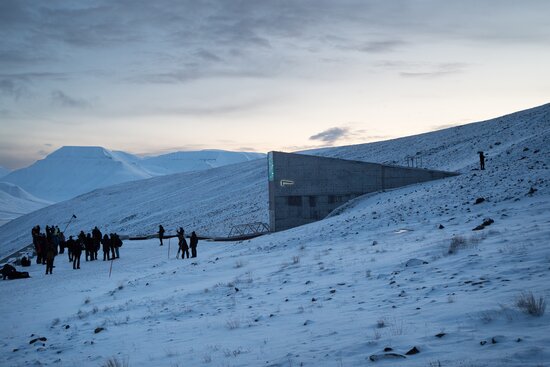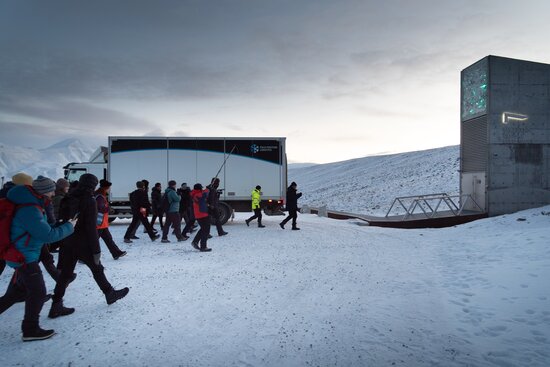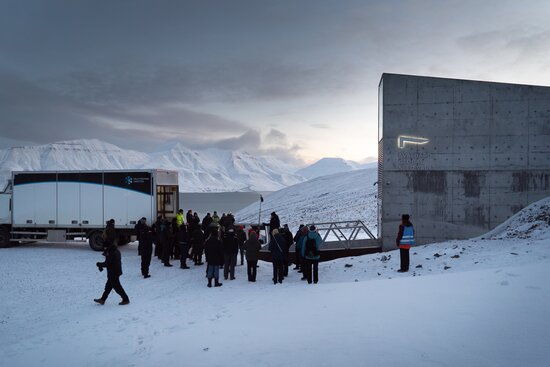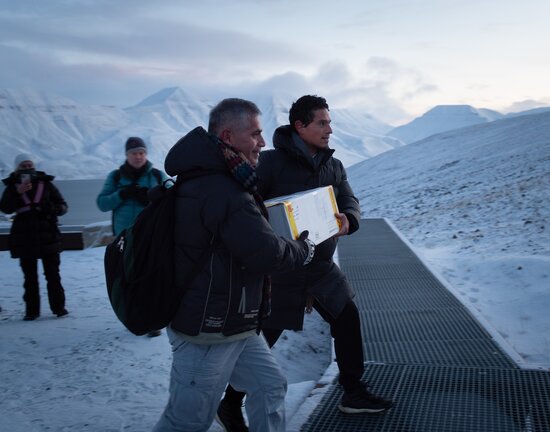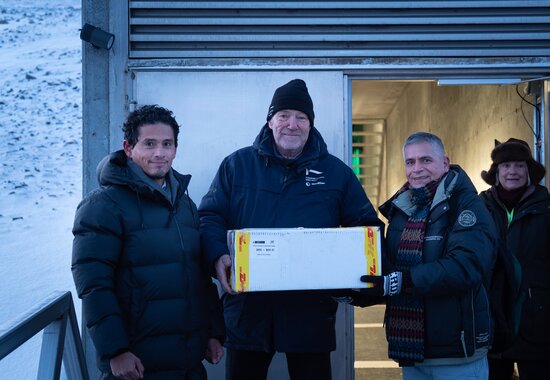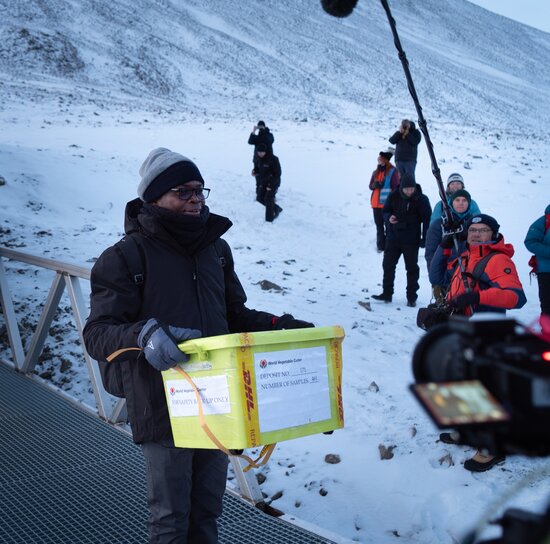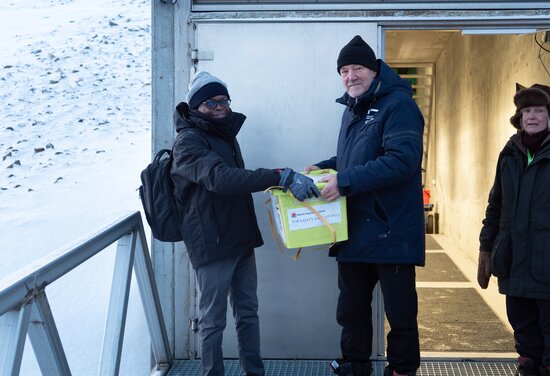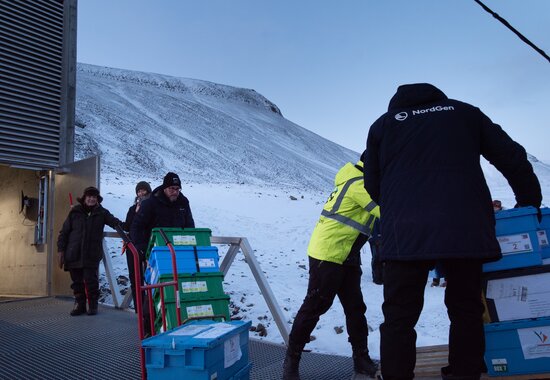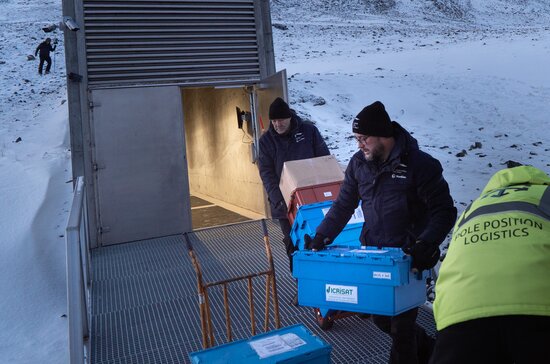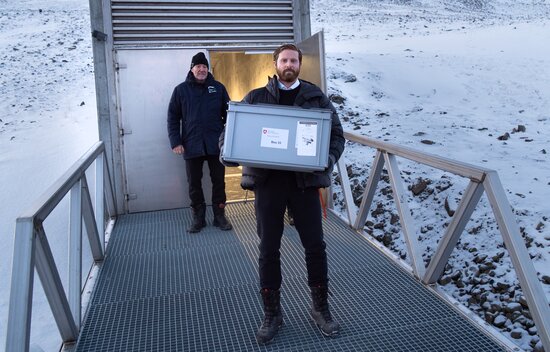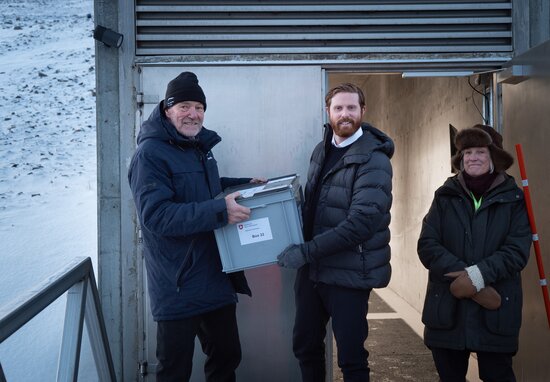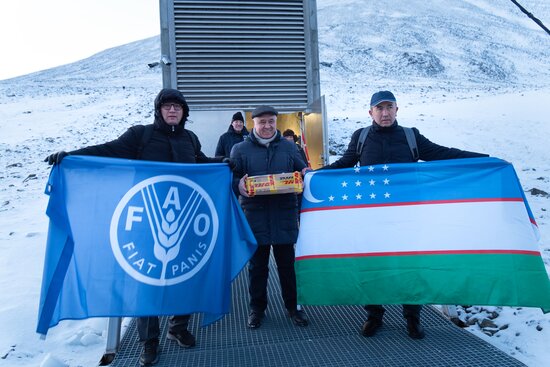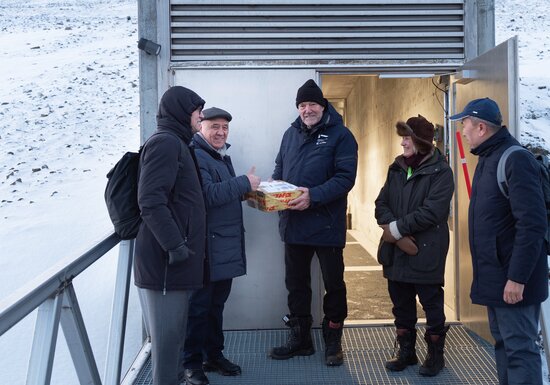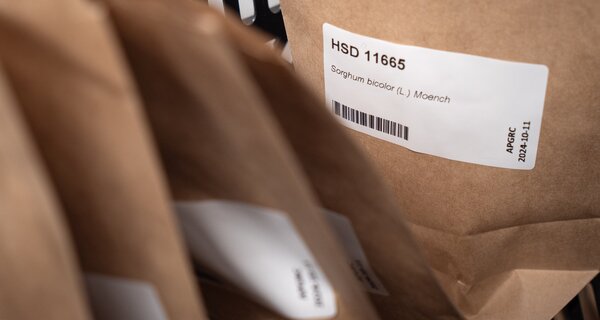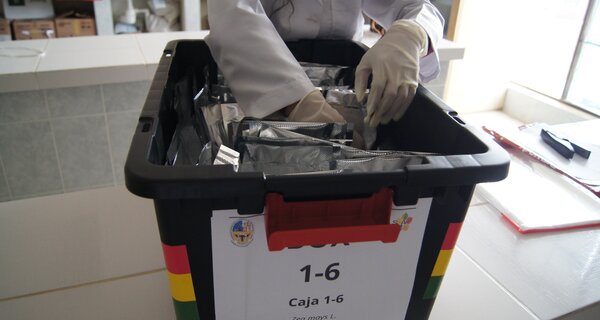Celebration Meets Urgency at Latest Seed Vault Opening in Svalbard
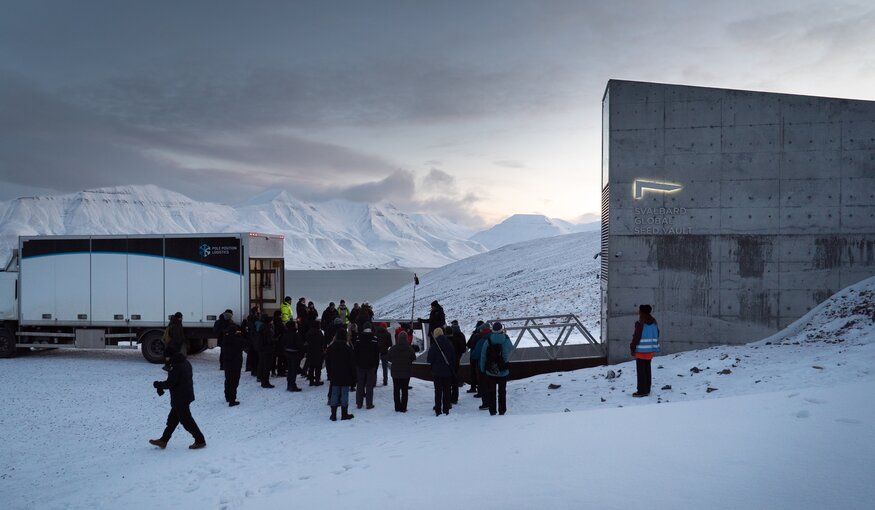
22 October 2025
LONGYEARBYEN, NORWAY, 22 October 2025 – Twenty genebanks representing every continent bar Antarctica deposited more than 21,000 seed samples to the Svalbard Global Seed Vault this week. Among them were new contributors from the Philippines and Peru, safeguarding crops that embody generations of farmers’ knowledge and culture. For depositors, this is a moment of celebration; for the rest of the world it’s a reminder of the urgent need to safeguard the world’s food supply.
The largest backup repository of crop diversity welcomed seeds of culinary staples such as Filipino rice and Peruvian chili peppers, as well as cultural icons like Ecuador’s chocho bean and Moroccan lavender. It received a major deposit from the World Vegetable Center (WorldVeg) genebank in Tanzania, which sent the largest-ever deposit of traditional African vegetable seeds to the Seed Vault.
This 68th deposit adds 21,647 seed samples to the more than 1.3 million seed samples already stored in the Seed Vault, for a total of 1,378,238. Located deep inside the Arctic permafrost on the Norwegian island of Spitsbergen, the facility is managed by the Norwegian Government, Nordic Genetic Resource Center (NordGen) and the Crop Trust.
A steady stream of seeds is backed up at the Seed Vault annually, but there are still many global crop diversity collections at risk around the world. Some genebanks have just started backing up, others have no backups at all – a gap driven largely by limited resources and lack of investment in genebanks.
Philippine Rice Research Institute Makes Debut Deposit
The largest shipment at this deposit event came from the Philippine Rice Research Institute (PhilRice), consisting of over 4,000 rice samples, including traditional and climate-resilient varieties such as Dinorado and Milagrosa.
“Safeguarding seed diversity at Svalbard provides vital protection against natural or man-made disasters, pests, diseases and accidents that could threaten our genebank in the Philippines,” said Jonathan M. Niones, Division Head and Chief Science Research Specialist at PhilRice. This marks the first time in PhilRice’s 40-year history that the genebank has secured seed duplicates outside the country.
World Vegetable Center Expands Its Global Backup
The World Vegetable Center’s milestone shipment to Svalbard featured more than 3,000 seed samples of 109 species collected across 30 African countries. It included amaranth, jute mallow, Bambara groundnut, African eggplant and okra – plants that are recognized as opportunity crops for their potential to improve diets, local economies and climate resilience. With this latest deposit, more than half of the seeds held at WorldVeg’s African genebank are now safely backed up in Svalbard.
Through the Crop Trust’s Building Opportunities for Lesser-known Diversity in Edible Resources (BOLDER) project, the genebank shares amaranth seeds with farmers in citizen science trials. Many of these are included in the latest deposit. The results are helping communities pinpoint promising varieties for future crop improvement.
BOLD: The Genebank Enabler
The genebank of Morocco’s Institut National de la Recherche Agronomique (INRA) deposited over 860 samples of 42 species, including landraces and wild species of cereals, legumes, vegetables and aromatic plants such as lavender and cumin.
“These samples are unique,” says Dr Ali Sahri, the genebank’s manager. “Most were collected in Morocco by our scientists or contributed by local researchers, and many have no duplicates anywhere else. Backing them up in Svalbard means they’ll be safe no matter what happens here at home.” Another depositor was Ecuador’s Instituto Nacional de Investigaciónes Agropecuarias (INIAP), which sent 890 accessions of chocho bean, amaranth, quinoa, maize and common bean.
Both Morocco’s and Ecuador’s deposits were made possible by the Crop Trust’s Biodiversity for Opportunities, Livelihoods and Development (BOLD) project, which is funded by the Government of Norway. “Thanks to BOLD, we’ve acquired specialized equipment to strengthen conservation and hire the personnel needed to carry out technical work like regeneration and safety duplication properly and on time,” said Dr César Tapia, Genebank Manager at INIAP.
Other Depositors: From Forages to Wild Relatives
Other depositors this month included the Australian Pastures Genebank, another BOLD project partner, which shipped more than 3,000 samples covering 270 forage species and native plants. Switzerland’s Station Fédérale de Recherches en Production Végétale de Changins deposited 20 new species of the evening primrose genus and a new genus, represented by Onopordon acanthium (cotton thistle), in the Seed Vault.
The International Livestock Research Institute (ILRI) in Ethiopia also deposited new samples of trees, shrubs, legumes and African forages. One new and notable deposit by ILRI was Tripsacum dactyloides – a wild relative and important ancestor of maize. According to Åsmund Asdal, Coordinator of the Svalbard Global Seed Vault, samples from this genus have not been secured in the Seed Vault before, despite its close evolutionary link to one of the world’s most important staple crops.
Each new deposit strengthens the world’s system of crop diversity conservation, but lasting food security depends on what happens beyond Svalbard. While celebrating another Svalbard deposit is good, recognizing the urgent need to invest in strong genebanks all over the world to secure the future of food is even better.
~~~
QUOTES:
The Crop Trust:
“As we celebrate the newcomers and repeat depositors at this week’s opening of the Svalbard Global Seed Vault, we must also remember the urgent need to conserve the world’s crop diversity in myriad genebanks around the world. Governments must step up support so genebanks can continue and expand their vital work and help secure enough food and nutritious diets where they are needed most,” says Dr Stefan Schmitz, Executive Director of the Crop Trust.
NordGen:
"This deposit symbolizes a global commitment to protecting the rich diversity of crops that sustains life on Earth. We warmly welcome both returning and new depositors from around the world who have chosen to safeguard their valuable seed sample duplicates in the cold chambers of the Seed Vault. Thank you for your trust,” says Dr Lene Krøl Andersen, Executive Director of NordGen.
Norwegian Ministry of Agriculture and Food:
“Safeguarding our crop diversity as the basis for our future food security is more important than ever,” said Nils Kristen Sandtrøen, the Norwegian Minister of Agriculture and Food when he signed the certificate of the Instituto Nacional de Innovación Agraria in Peru. The Certificate confirms that they are making their first safety deposit to the Svalbard Global Seed Vault. ”I humbly recognize all the efforts of the genebanks to sow and prepare the seeds for shipment to Svalbard – in the Arctic, close to the North Pole.
Seed deposits October 2025
Genebanks | Country | Accessions | Boxes | Crops |
Philippine Rice Research Institute (new) | Philippines | 4417 | 8 | Rice |
World Vegetable Center (Tanzania) | Taiwan | 3177 | 5 | 131 species of vegetables and legumes |
Australian Pastures Genebank | Australia | 3687 | 3 | 270 forage species, some new species for the Seed Vault |
International Crops Research Institute for the Semi-Arid Tropics (ICRISAT) | India | 2201 | 4 | 25 species of sorghum, Pennisetum, Cajanus, Arachis, and others |
International Livestock Research Institute (ILRI) | Ethiopia | 1518 | 2 | 347 species, >50 new genera/species to the Seed Vault |
Plant Breeding and Acclimatization Institute (IHAR) | Poland | 1230 | 3 | Barley and oat species and subspecies |
SADC Plant Genetic Resources Centre (SPGRC) | Zambia | 1150 | 15 | 26 species of rice, sorghum, pigeon pea, sunflower, groundnut and others. |
Station Federale de Recherches en Production Vegetale de Changins | Switzerland | 921 | 6 | 81 crops, cereals, herbs and vegetables, e.g. 20 species of primrose / Oenothera that are new to the Seed Vault |
Instituto Nacional Autónomo de Investigaciones Agropecuarias (INIAP) | Ecuador | 890 | 10 | Amaranth, quinoa, maize, lupins and beans |
Institut National de la Recherche Agronomique (INRA) | Morocco | 863 | 4 | 42 species of cereals, legumes, vegetables, and others. |
Portuguese Bank of Plant Germplasm | Portugal | 473 | 4 | Maize, rye and barley |
Nordic Genetic Resource Center (NordGen) | Nordic countries | 381 | 1 | 66 species of cereals, forages, herbs |
Taiwan Agricultural Research Institute | Taiwan | 320 | 3 | Vigna radiata, Setaria italica, Capsicum annuum, Hibiscus sabdariffa, Cucumis sativus, different Brassica species and Arachis hypogaea |
Czech Agrifood Research Center | Czech Republic | 150 | 1 | 46 species of cereals, vegetables, legumes and herbs |
Suceava Genebank ”Mihai Cristea” | Romania | 68 | 1 | Maize |
Latvian State Forest Research Institute "Silava" | Latvia | 67 | 1 | 27 species of forages, cereals, legumes and vegetables |
National Plant Genebank, Ministry of Agriculture | Croatia | 47 | 1 | Maize |
ICRISAT, BSF-project Malawi | Malawi | 43 | 1 | Groundnut, chickpea, pigeon pea, millets and sorghum |
Uzbek Research Institute of Plant Industry | Uzbekistan | 20 | 1 | Wheat and vegetables |
Instituto Nacional de Innovación Agraria (INIA) BSF-project (new) | Peru | 25 | 1 | Capsicum species |
TOTAL | 21,647 |
Important Facts about the Svalbard Global Seed Vault
- The Svalbard Global Seed Vault is a black-box long-term safety deposit of crop diversity open to all qualifying institutions around the world.
- Ownership of seeds remains with the depositor and only the depositor can withdraw their seeds and open the boxes.
- Safety deposit storage of seeds is provided at no cost, as the Seed Vault is a publicly owned, non-commercial facility.
For more information, please visit www.seedvault.no
ABOUT
The Norwegian Ministry of Agriculture and Food is the legal and administrative body of the Seed Vault and has the overall responsibility for its management, security and funding. The Ministry has assigned Statsbygg, the key adviser on construction and property to the Norwegian Government to be responsible for the construction and maintenance of the Seed Vault. For more information see www.regjeringen.no
NordGen is the Nordic countries’ genebank and knowledge centre for genetic resources. As the operational manager of the Seed Vault, NordGen is responsible for handling the seeds inside the Seed Vault; communicating with genebanks, and maintaining a publicly accessible online database with information on the seed samples stored in the Seed Vault (seedvault.nordgen.org). Read more about NordGen at www.nordgen.org
The Crop Trust is an international organization working to conserve crop diversity that protects global food and nutrition security. At the core of Crop Trust is an endowment fund dedicated to providing guaranteed long-term financial support to key genebanks worldwide. The Crop Trust supports the Svalbard Global Seed Vault and coordinates large-scale projects worldwide to secure crop diversity and make it available for use, globally forever and for the benefit of everyone. The Crop Trust is recognized as an essential element of the funding strategy of the International Treaty on Plant Genetic Resources for Food and Agriculture. Learn more at www.croptrust.org
The Biodiversity for Opportunities, Livelihoods and Development (BOLD) Project is a 10-year project to strengthen food and nutrition security worldwide by supporting the conservation and use of crop diversity. The project works with national genebanks, pre-breeding and seed system partners, globally. Funded by the Government of Norway, BOLD is led by the Crop Trust in partnership with the Norwegian University of Life Sciences and the International Plant Treaty. Learn more at https://bold.croptrust.org/
Categories: Press Releases, BOLD, Svalbard Global Seed Vault, Food Security

